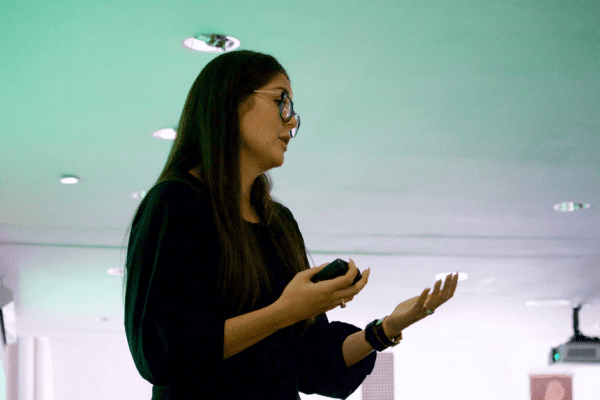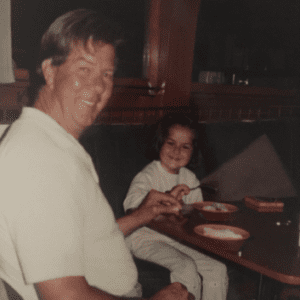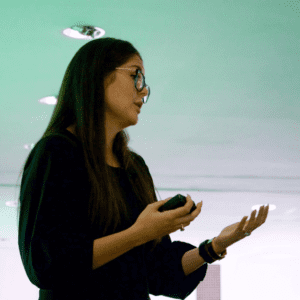Not too long ago, I was boarding a plane to the home of some of the brightest minds in the world, Harvard University, to speak to students at Harvard’s Asian and International Relations conference.
So how did I, a girl with dyslexia from Australia, make it to this iconic Ivy League Institution in Boston, Massachusetts?
About 20 years ago, I mustered up the courage to tell my dad (Barry Iles, otherwise known affectionately to his friends as big bad Baz) that I couldn’t read or write properly. I told him that I was dyslexic, and had basically used every excuse under the sun to fudge my way through school.
Dad (Barry), at the time, was relaxing after a hard day’s work with a glass of whiskey and ice and watching the news on TV. My confession was completely out of the blue. I had just started my final year of school at a private girls’ school in Melbourne and I am sure this was the last thing he was expecting to hear. To his credit, after muting the news and asking me to repeat myself, he looked me straight in the eyes and said: “I’m proud of you for being honest, you’re going to have to work harder than anyone else to get what you want but … if Richard Branson can do it, so can you”.

That one sentence has shaped each day of my life since. It’s played quietly on a loop, somewhere in the back of my mind on a daily basis. Without a doubt, it was the most valuable lesson and the best advice I have received.
It’s what got me to Harvard.
Now that my father has died, I wanted to share his advice and its impact on me, so that his legacy can live on.
Twenty years ago, my dyslexia was viewed as a disability. It made me believe I was stupid. At the age of 17, I found it near impossible to write or read properly. When I tried to read, the words hovered and vibrated on a page. They seemed to change shape and refused to take an orderly form. It may sound like a Harry Potter inspired spell, but my experience was far from magical. Reading a page was a mammoth task that was exhausting, frustrating, heartbreaking and near impossible. To get a quick taste of what it was like take a look at this.
I was convinced that my future was bleak. How does someone succeed in life when they cannot read or write? An inability to do so affects how we interpret the world and communicate. At the time (1998), one’s ability to read and write also acted as a measure of intelligence, capability and worth. I felt that my value was running in the negatives and that nothing was possible.
The reason I finally opened up about my dyslexia was because I desperately wanted to make something out of my life. I was tired of hiding behind a range of excuses about why “I couldn’t do this or that”. I had nowhere else to hide or run; my deepest darkest secret followed me around like a dark cloud and I wanted to get rid of it.
After my confession, I had to make up for lost time. I needed to try and finish school with a mark that would allow me to get into university, let alone the course I wanted to study (psychology), I learnt how to work hard. I had a series of tutors give me a crash course in English and how to use it. During this time, someone close to our family got an opportunity to study at Harvard. I remember it being a really, really big deal. I had so much admiration for them making it there. I also remember thinking, “There is no way in a million years that I will ever go to Harvard” while also harbouring a deep desire to find my way there, if at all possible.
My first contact with Harvard University came in June last year, completely out of the blue and without any solicitation on my part. I will never forget it as it was the day my father died after a long battle with Alzheimer’s.
It seemed that fate had stepped in. Initially the request was to speak at Harvard’s conference in Sydney (17 – 21 Aug, 2017), a little over a year later, I found myself at the university itself, standing on its seemingly sacred snow-covered grounds and speaking to students from around the world.
This article is not to gloat, blow my trumpet or seek your admiration.
Rather, it’s to ask you a couple of simple questions: What is it in life that you don’t think you can achieve but you desperately want to?
What have you told yourself that you can’t do and are leaving to ‘other smarter, talented, capable etc’ people to do?
I challenge you not only to believe it is possible, but to understand the work required to chase your dreams. To push past the discomfort and anxiety that comes with facing your fears. To keep going when you don’t have all the answers and to continue to toil away working tirelessly toward your dream without ANY feedback that you are heading in the right direction.
It took 18 years for me to meet Richard Branson and thank him for lighting the way and showing me that dyslexia is not a weakness but my greatest strength. And it took me 20 years to be invited to Harvard.
Trust me, if I (the girl from Australia with dyslexia, someone who still struggles to read and write properly and who has all their important work checked by their partner to make sure it is written in proper English and not dysfuxia as I like to call it) can do it, then you can too. “If you work harder than anyone else, you can get what you want”.
In loving memory of Barry J Iles.





